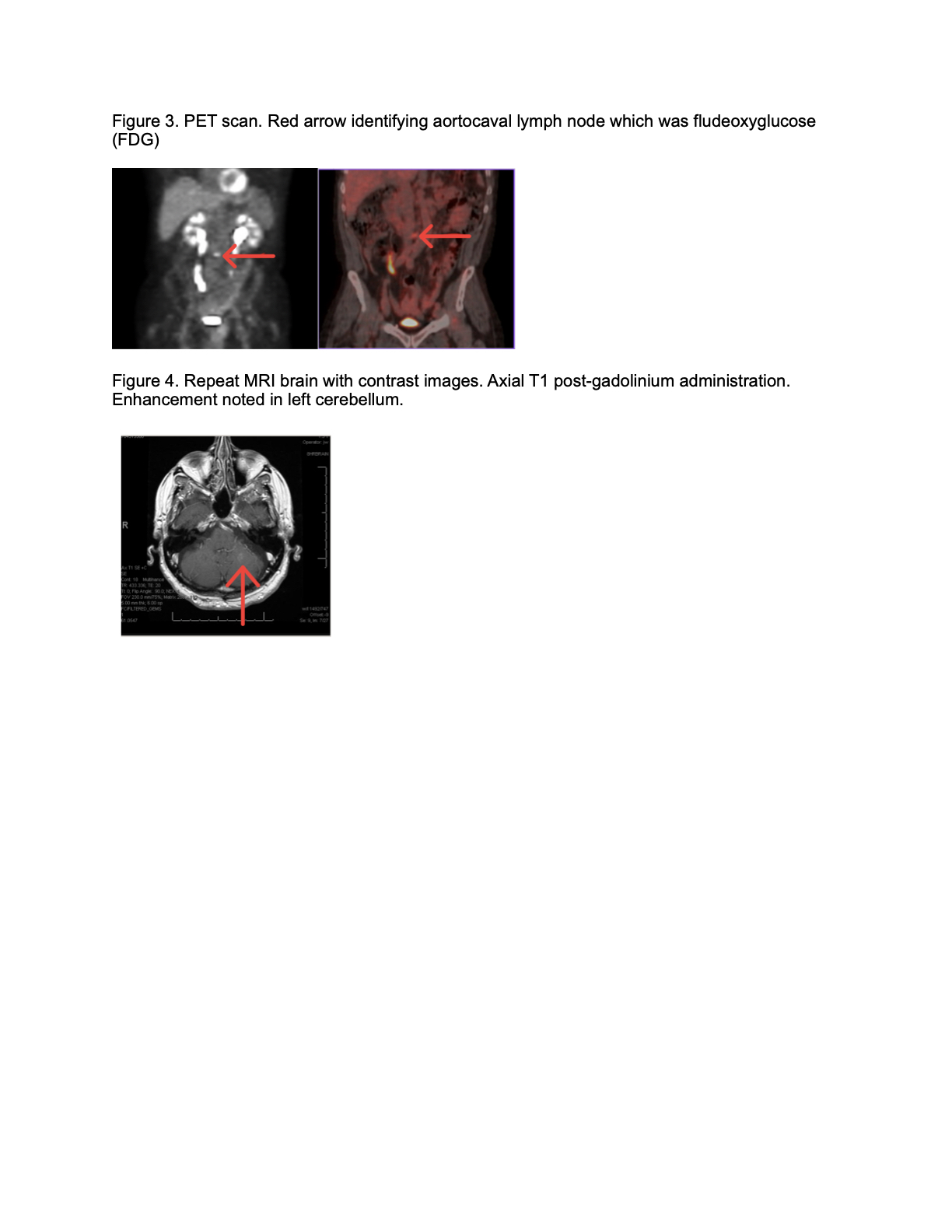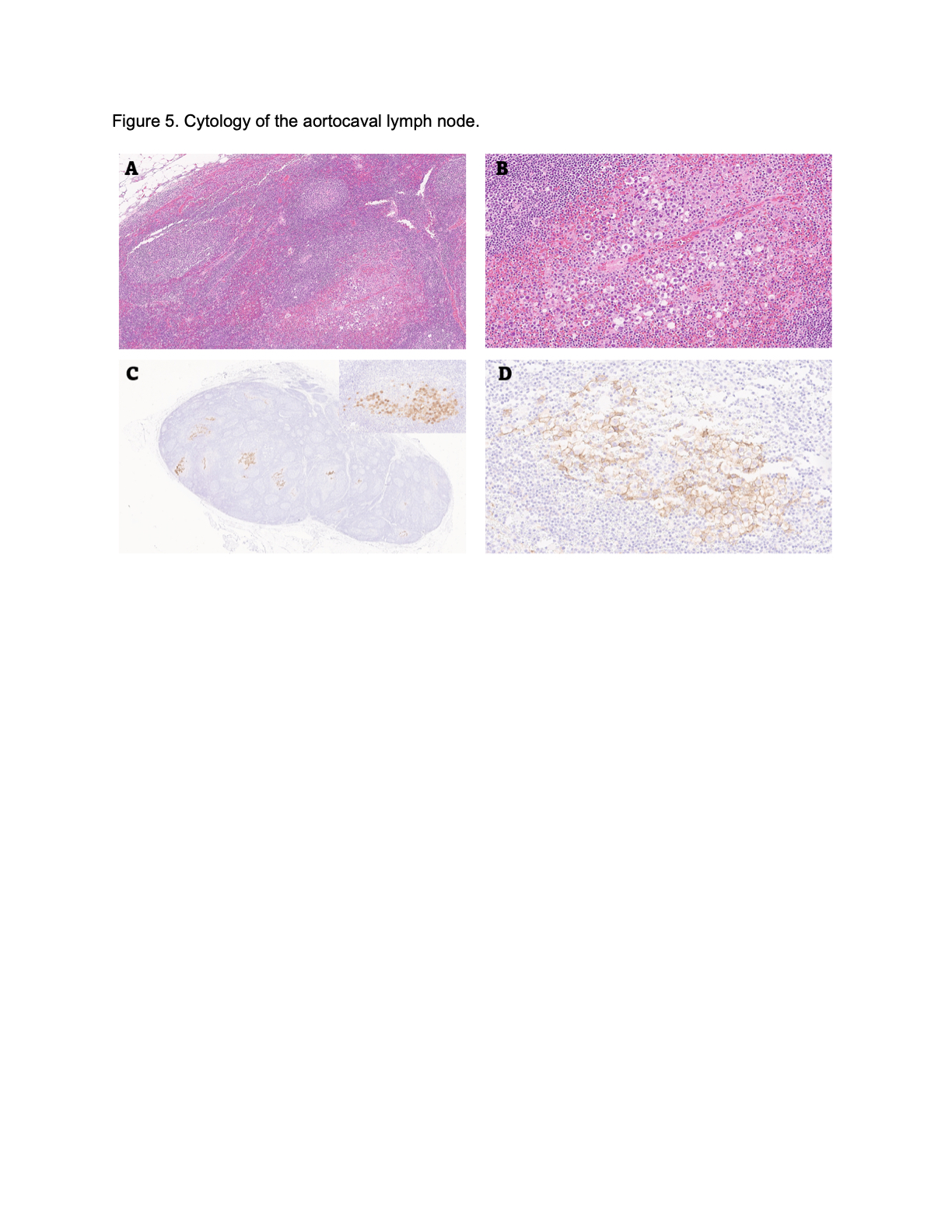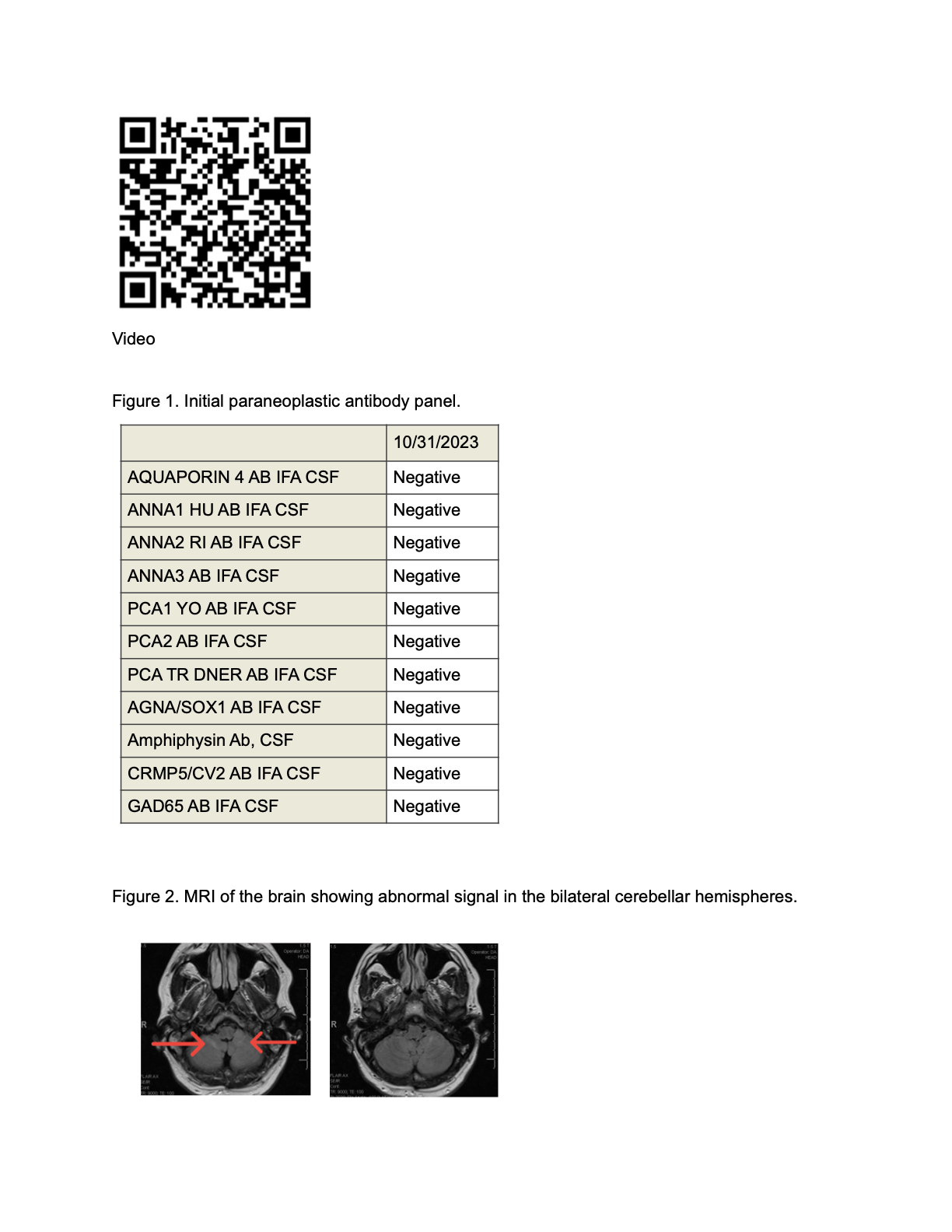Category: Ataxia
Objective: We describe a case of retroperitoneal seminoma resulting in paraneoplastic progressive cerebellar syndrome secondary to KLHL11 and LUZP4 antibodies.
Background: Testicular cancer covers a wide range of neoplasms. Extragonadal locations, such as the mediastinum and retroperitoneum may occur (1). Germ cell tumors account for approximately 95% of testicular cancer (1).
Paraneoplastic neurological syndrome (PNS) is a rare complication of malignancy with an immune mediated mechanism for development. Movement disorders are one way in which a PNS may present. Clinical manifestations include parkinsonism, ataxia, myoclonus, and chorea. KLHL11 antibodies were found to be associated with seminoma-associated PNS (2), and the LUZP4 antibody was found as a biomarker of germ cell tumor-associated PNS (3).
Method:
A 66-year-old male presented to our clinic 5 months after a fall with progressive imbalance, incoordination, and subjective weakness. On examination, he had mild dysarthria, nonsustained jerk nystagmus, dysmetria on finger-to-nose with overshoot and dysdiadochokinesia. His gait was wide-based and spastic, requiring a straight cane (see video).
MRI of the brain showed areas of abnormal signal in the cerebellum bilaterally (see figure 1). Full body PET scan revealed a single 1.2-centimeter aortocaval lymph node.
Initial paraneoplastic panel was negative; however, serum and CSF autoantibodies were performed at 7 months with the progressive decline in gait. Serum and CSF KLHL11 antibodies were positive at 1:7680 (normal < 1:280) as well as serum LUZP4. His retroperitoneal lymph node dissection revealed a histopathology and immunohistochemistry consistent with seminoma germ cell pathology.
Results: The patient was started on cyclophosphamide 750 mg/m² alternating therapy with IVIG every 2 weeks for treatment.
Conclusion: In some cases of germ cell seminoma, an immune mediated PNS may develop. This case is distinct as it reveals dual positive antibodies, KLHL11 and LUPZ4. This case illustrates the importance of clinical vigilance and perseverance with testing of a clinically suspicious PNS in a patient with a rapidly progressive cerebellar syndrome without findings to support an alternative diagnosis.
PET scan and MRI brain findings
Pathology
Video
References: 1.Vaughn DJ. Testicular Cancer. In: Jameson J, Fauci AS, Kasper DL, Hauser SL, Longo
DL, Loscalzo J. eds. Harrison’s Principles of Internal Medicine, 20e. McGraw-Hill
Education; 2018. Accessed March 06, 2024. https://accessmedicine.mhmedical.com/
content.aspx?bookid=2129§ionid=192016379
2. Mandel-Brehm C, Dubey D, Kryzer TJ, O’Donovan BD, Tran B, Vazquez SE, Sample HA, Zorn KC, Khan LM, Bledsoe IO, McKeon A, Pleasure SJ, Lennon VA, DeRisi JL, Wilson MR, Pittock SJ. Kelch-like Protein 11 Antibodies in Seminoma-Associated Paraneoplastic Encephalitis. N Engl J Med. 2019 Jul 4;381(1):47-54. doi: 10.1056/ NEJMoa1816721. PMID: 31269365; PMCID: PMC6800027.
3. Dubey, D., Kryzer, T., Guo, Y., Clarkson, B., Cheville, J.C., Costello, B.A., Leibovich, B.C., Algeciras-Schimnich, A., Lucchinnetti, C., Hammami, M.B., Knight, A.M., Howe, C., Lennon, V.A., McKeon, A. and Pittock, S.J. (2021), Leucine Zipper 4 Autoantibody: A Novel Germ Cell Tumor and Paraneoplastic Biomarker. Ann Neurol, 89:
1001-1010. https://doi.org/10.1002/ana.26050
To cite this abstract in AMA style:
R. Orie, V. Suski, G. Quiroga-Garza, J. Linnoila. Seminoma resulting in rapidly progressive cerebellar syndrome with associated dual positive kelch-like protein 11 (KLHL11) IgG and leucine zipper 4 (LUZP4)–immunoglobulin G (IgG) antibodies. [abstract]. Mov Disord. 2024; 39 (suppl 1). https://www.mdsabstracts.org/abstract/seminoma-resulting-in-rapidly-progressive-cerebellar-syndrome-with-associated-dual-positive-kelch-like-protein-11-klhl11-igg-and-leucine-zipper-4-luzp4-immunoglobulin-g-igg-antibodies/. Accessed February 7, 2026.« Back to 2024 International Congress
MDS Abstracts - https://www.mdsabstracts.org/abstract/seminoma-resulting-in-rapidly-progressive-cerebellar-syndrome-with-associated-dual-positive-kelch-like-protein-11-klhl11-igg-and-leucine-zipper-4-luzp4-immunoglobulin-g-igg-antibodies/



